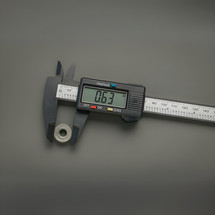15th Apr 2025
Best Measuring Instruments for Beginners: What You Need to Know
Whether you’re fine-tuning assembly, shaping metal parts, or ensuring every component fits just right, accuracy is non-negotiable. You can’t expect miscalculations; even the slightest error can throw off your project.
However, that’s not the case with premier precision measuring instruments.
Switching between calipers, micrometers, and gauges can initially feel overwhelming, but don’t worry, we’re here to break it down for you.
In this blog, we’ll take a closer look at the best measuring instruments for beginners. So, continue reading as we learn about some must-have tools and help you understand the best tools for your operations. Let’s get started.
Why Precision Measuring Tools Matter for Beginners?
Let's understand their role before we read more about different precision tools. Precision monitoring tools are at the core of quality and efficiency in every field. They ensure precise, consistent, and dependable readings, whether your task involves massive assemblies or small-scale items.
What’s more? It further allows you to avoid expensive mistakes, develop work confidence, and avoid early errors. Interestingly, that’s where tools from reliable site like Penn Tool Co. step into the picture. These tools are designed with quality and precision, allowing newcomers to simplify their learning curve with professional development.
Now that we understand why precision tools matter, let’s look at them in the following sections.
Best Measuring Instruments for Beginners
1 Calipers: The Beginner’s Essential
When planning to buy your first instrument, let it be a caliper.
Calipers are simple to operate and can measure interior dimensions, exterior dimensions, depth, and step measures. They’re the type of Caplipers for beginners and are known for their flexibility. Tools like the Fowler Sylvac Ultra-Cal Mark IV digital calipers provide precise digital readouts that eliminate scale reading guesswork.
Types of calipers to consider:
- Vernier Calipers — Excellent for learning how to read manual measurements.
- Dial Calipers — A little easier to read than vernier.
- Digital Calipers — Highly recommended for beginners for ease of use.
What Makes Them Great?
Calipers give you quick, accurate measurements for everyday tasks. You’ll use them constantly!
2 Micrometers: For Improved Accuracy
Once you’re comfortable using calipers, it’s time to upgrade your skills with the micrometer. Micrometers are an excellent tool for better accuracy and come in handy when you require detailed measurements of tiny components, especially in machining and engineering.
Are you planning to buy a micrometer? Start your journey with the Mitutoyo Outside Micrometer, known for its precision and durability.
Here are some types of micrometers to consider, depending on what you plan to measure:
- Outside Micrometers — These are used to measure the thickness or outside diameter.
- Inside Micrometers — Measure internal dimensions.
- Depth Micrometers — Perfect for measuring depths of holes or slots.
What Makes Them Great?
Micrometers teach you precision down to the thousandth of an inch or hundredth of a millimeter — essential skills for advanced machining work.
3 Dial Indicators: Detect Deviations
Next, we suggest going with dial indicators. They’re perfect for verifying equipment alignment and surface variation detection. As you progress in your career, you’ll understand the precise readings the tool gives. It also guarantees that parts and equipment configurations satisfy high tolerances.
Planning to buy dial indicators? Don’t forget to check out the Fowler AGD Dial Indicator from Penn Tool Co. It’s a reliable option, easy to read, and robust enough for regular use.
Key uses:
- Check surface flatness
- Measure the alignment of components
- Detect runout (wobble) in rotating parts
What Makes Them Great?
They visually show very minute deviations, making them a must-have for setups and inspections.
4 Gauge Blocks: Build Your Accuracy Foundation
Popularly known as "Jo blocks," gauge blocks are very precise, hardened steel tools stacked to produce specified lengths. They’re an excellent tool for beginners to learn measurement standards and tool calibration.
Ready to start using gauge blocks? Remember to check out the Mitutoyo Grade AS-1 Steel Gauge Block Set. It is a high-quality set that offers accurate calibration.
What Makes Them Great?
Gauge blocks help ensure your measuring tools remain accurate over time and are essential for precision setups.
5 Height Gauges: Vertical Precision
As you advance in your career, you’ll come across different tools that give high-precision details. However, sometimes, you’ll need to measure the height of parts or mark out precise points on a workpiece. Height gauges can be a great tool in such instances.
Consider the Fowler Trimos Height Gauge — it’s beginner-friendly and delivers precision and ease of operation.
Key uses:
- Measuring part heights
- Marking out workpieces
- Comparing part dimensions
What Makes Them Great?
Height gauges improve your layout and inspection accuracy, especially when working on complex components.
6 Feeler Gauges: Check Small Gaps
Feeler gauges are thin strips of metal used to measure gaps or clearances between parts. They are essential for engine work, machinery setup, and inspections.
Check out the Gearwrench Feeler Gauge for a durable, beginner-friendly option. They’re a great option if you plan to make a difference in your calculations.
What Makes Them Great?
They’re inexpensive, easy to use, and essential for checking clearances, such as spark plug gaps or blade adjustments.
7 Angle Measuring Tools: For Perfect Angles
Accurate angle measurement is essential for machine setup and part geometry verification, and instruments such as digital angle finders or universal bevel protractors are ideal.
The SPI Digital Protractor is an excellent tool for novices because its digital readout makes measuring and setting angles quick and easy.
What Makes Them Great?
They simplify complex setups and help ensure the accuracy of angled cuts and fits.
Pro Tips for Beginners to Handle Precision Tools
- Be Careful While Handling:
Precision tools are delicate equipment. Always hold them carefully; do not drop them or use them in surroundings high in dust, oil, or wetness. Their calibration may be thrown off even by a little ineffective handling.
- Clean Before & After Use:
Always wash your utensils before measuring and once you're done. Residues or small particles can compromise accuracy. Wipe surfaces with a soft, lint-free cloth, and make sure the workpiece is clean.
- Zero Your Tools:
Check and zero your equipment before each measuring session, particularly with digital calipers and micrometers. This guarantees a correct baseline from which you start.
- Store Properly:
When not in use, keep your instruments in their protective cases. Avoid piling them or toppling bulky stuff on top. Good storage maintains accuracy and increases their lifetime.
- Establish A Technique:
Use tools with constant pressure and handling methods. Changing pressure, particularly with micrometers and calipers, can cause erratic readings.
- Be Frequent With Calibrations
Premium instruments even require periodic calibration. Following a maintenance plan can help you maintain your tools precisely.
Now You Know!
Kickstarting your career in machining, manufacturing, or engineering is interesting. However, having the correct measurement tools at hand makes all the difference. Every instrument you use sharpens your accuracy and increases your confidence from your first caliper measurement to mastery of the micrometer and beyond.
Tools from reliable vendors like Penn Tool Co. guarantee you are making investments in quality that will help you advance professionally. Remember, accuracy is the key rather than an ability.
Accept the road and celebrate your measures, and soon you will be producing work that passes even the most rigid quality criteria.

